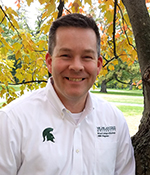From Military Life to Campus Life: How Veterans Can Ease into a Higher Ed Career


Wayne Hutchison is the Managing Director of the Full-Time MBA Program at the Broad College of Business at Michigan State University. Before that, he served in U.S. Air Force from 1997-2018, earning the rank of Major.
A veteran’s transition to civilian life, specifically a job in higher education, isn’t always smooth. Wayne Hutchison shares advice in making a career change from the military to higher education, including how to ease the transition to civilian life and what to expect from a higher ed institution.
What To Look For When Applying
When military members move to a new installation, they frequently are paired with a sponsor or mentor that will help onboard and educate them. Ideally, a higher ed institution would also be able to connect you with a veteran sponsor that is currently on staff, especially in places that traditionally have a high military or national guard population.
Sometimes it can be difficult to locate a veteran sponsor, so you should also consider connecting with mentors in career fields you are interested in.
“I realized in this day and age there are so many resources to make that connection technologically,” Hutchison said. “But you cannot replace or devalue what it means to have the human factor, and if you have a vet that can have that conversation with.”
If a mentoring or sponsor program isn’t available at the school that you’re looking at, there are also federal, state, and local agencies that have mental, medical, and support resources for veterans and their families.
The transitions a family can also go through are significant, and the needs that a family will require are diverse. Even if you have difficulties in connecting to individuals with firsthand military experiences, many support resources across the country that can help a military family in transition exist.
Adjusting to a New Workplace Culture
There are many aspects of a higher ed workplace that will feel familiar to veterans. In both environments, you are working with large groups of people on a deadline for a common cause. But there are differences that aren’t necessarily better or worse, but do require an adjustment.
While the military presents a linear chain of command where it’s clear how decisions will get made, a higher ed workplace may require decision making by consensus or crowdsourcing.
In military service, a diverse group of individuals goes through similar training and development, with a common connection based on the work they do, to create a strong collective. In the higher education environment, military veterans can find challenges in connecting professionally with others that do not share their experiences.
The speed at which you operate may also be an adjustment, since many of the tasks you complete in a workday may not be emergency-related or high-stakes in nature.
One thing that helps is to never refuse training and always be on the lookout for educational opportunities to prepare for new roles. Hutchison has said yes every time he’s asked to be on a committee or consider taking a workshop. It’s another example of how the ethos he developed in military service has helped him sustain a second career. He also pursued his Ph.D., a six-year odyssey that has prepared him to advance in his career in higher education administration.
“For veterans looking to transition into roles in higher education, know that it can be a very rewarding experience, with several opportunities to leverage skills and expertise honed during your military service,” Hutchison said. “Advance planning and research, paired with a willingness to adapt to available roles, will help set you up for success. After you make the transition, continue to look for opportunities to serve the institution while identifying areas for personal growth.”
Check out Top Articles on HERC Jobs.
Download our free ebook, Veterans Transitioning Into Higher Ed (Revised Edition) for more information on your shift from military to civilian careers. Explore additional resources for veterans from HERC Jobs.
About the Author: Harold Gutmann is the director of brand and marketing strategy at Santa Clara University. He is a longtime writer and editor who is proud to work in higher education, and encourages all job seekers to consider it.
